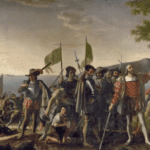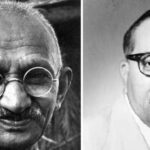Swami Vivekananda, born Narendranath Datta on January 12, 1863, in Calcutta, India, was a key figure in the introduction of Indian philosophies of Vedanta and Yoga to the Western world. His life was marked by a relentless quest for spiritual truth and a deep commitment to social reform.
1. Early Life
- Swami Vivekananda was born as Narendra Nath Datta on January 12, 1863, in Calcutta, India, to an affluent Bengali family.
- Narendra showed a keen interest in spirituality from a young age. He was deeply influenced by his mother’s devoutness and her stories of Hindu mythology, which instilled in him a sense of spirituality and religious tolerance.
2. Meeting Ramakrishna
- In 1881, Narendra met Sri Ramakrishna Paramahamsa, a mystic saint, who would later become his guru.
- Under the guidance of Ramakrishna, Narendra underwent various spiritual practices and had profound mystical experiences that transformed his life.
3. Transformation to Swami Vivekananda
- After the passing of Ramakrishna in 1886, Narendra and a group of his fellow disciples founded the Ramakrishna Mission.
- Narendra renounced the worldly life and took on the name Swami Vivekananda, meaning “the bliss of discerning wisdom.”
4. Journey to the West
- In 1893, Swami Vivekananda represented Hinduism at the World’s Parliament of Religions in Chicago.
- His famous speech, which began with the words “Sisters and brothers of America,” introduced Hindu philosophy to the Western world and made a significant impact.
- After the Parliament, Vivekananda toured various cities in the United States and Europe, giving lectures on Vedanta and Yoga and promoting interfaith understanding.
5. Establishment of Ramakrishna Mission
- In 1897, Swami Vivekananda founded the Ramakrishna Math and Mission in Calcutta.
- The mission aimed to propagate the teachings of Ramakrishna and serve humanity through spiritual, educational, and philanthropic activities.
- The organization’s activities included running schools, colleges, hospitals, and relief work during natural disasters.
6. Philosophical Contributions
- Swami Vivekananda’s teachings emphasized the harmony of religions, the importance of practical spirituality, and the potential for individual self-realization.
- He stressed the idea that all religions lead to the same ultimate truth and advocated for the upliftment of the masses through education and self-reliance.
7. Final Years and Legacy
- Swami Vivekananda passed away on July 4, 1902, at the age of 39.
- Despite his relatively short life, his impact on the world was profound. His teachings continue to inspire millions around the globe, and the Ramakrishna Mission, which he founded, remains active in various humanitarian endeavors worldwide.
- Swami Vivekananda’s legacy includes his writings, speeches, and the institutions he established, which serve as a beacon of spiritual and social upliftment for humanity.
Some of his notable books include:
- “Complete Works of Swami Vivekananda”: This comprehensive collection contains his complete works, including lectures, letters, conversations, and writings. It’s an invaluable resource for anyone interested in Vivekananda’s teachings.
- “Raja Yoga”: This book is a comprehensive guide to the practice of Raja Yoga, as expounded by Swami Vivekananda. It covers various aspects of yoga, including concentration, meditation, and self-discipline.
- “Karma Yoga”: In this book, Vivekananda explains the concept of Karma Yoga, the yoga of selfless action. He emphasizes the importance of performing one’s duties without attachment to the results.
- “Bhakti Yoga”: Vivekananda explores the path of devotion (Bhakti Yoga) in this book, discussing the different forms of devotion and the relationship between the devotee and the divine.
- “Jnana Yoga”: This book delves into the path of knowledge (Jnana Yoga), discussing the nature of reality, the self, and the process of self-realization.
- “Lectures from Colombo to Almora”: This collection features Vivekananda’s lectures delivered during his travels in India. It covers various topics such as Vedanta philosophy, Hinduism, and social issues.
- “Inspired Talks”: This book contains conversations and interactions with Swami Vivekananda, offering insights into his teachings and personality.
- “My Master”: Swami Vivekananda’s tribute to his guru, Sri Ramakrishna Paramahamsa. It provides a glimpse into the life and teachings of Ramakrishna and their profound spiritual relationship.
- “Practical Vedanta”: In this book, Vivekananda presents Vedanta philosophy in a practical and accessible manner, addressing the challenges of modern life.
- “The Gospel of Sri Ramakrishna”: Although not written by Vivekananda himself, this book records the teachings and conversations of his guru, Sri Ramakrishna, which had a profound influence on Vivekananda’s own philosophy.
IDEOLOGY OF SWAMI VIVEKANANDA:
Swami Vivekananda’s ideology encompasses a wide range of philosophical, spiritual, and social principles. Here are some key aspects of his ideology:
1. Vedanta Philosophy:
- Vivekananda was deeply influenced by the teachings of Vedanta, which emphasize the oneness of existence, the divinity of the soul, and the unity of all religions.
- He stressed the idea that each individual has the potential to realize their own divinity through spiritual practice and self-realization.
2. Practical Spirituality:
- Vivekananda believed in the practical application of spiritual principles in everyday life. He emphasized the importance of combining spiritual ideals with social action and service to humanity.
- According to him, spirituality should not be confined to mere rituals or abstract philosophy but should be lived and practiced in the service of others.
3. Universalism and Religious Harmony:
- Vivekananda advocated for the harmony of religions, asserting that all paths lead to the same ultimate truth. He believed in respecting and understanding different religious traditions.
- His famous speech at the World’s Parliament of Religions in Chicago in 1893, where he addressed people as “Sisters and brothers of America,” exemplifies his universalistic approach.
4. Service to Humanity:
- Swami Vivekananda placed great emphasis on serving humanity as a means of worshipping the divine. He believed that true spirituality involves selfless service to those in need.
- He founded the Ramakrishna Mission with the twin ideals of self-realization and service to humanity, which continues to provide educational, healthcare, and relief services worldwide.
5. Education and Empowerment:
- Vivekananda stressed the importance of education as a means of individual and societal transformation. He believed in empowering individuals through knowledge and self-reliance.
- He advocated for education that not only imparts academic knowledge but also fosters moral and spiritual development.
6. Self-Realization and Self-Confidence:
- Vivekananda taught that each individual is inherently divine and possesses unlimited potential. He encouraged people to have faith in themselves and their abilities.
- He believed that realizing one’s own divinity and developing self-confidence are crucial for personal growth and societal progress.
7. Social Reform and Nationalism:
- Vivekananda was deeply concerned about the social and economic condition of India. He called for the upliftment of the masses, especially the poor and downtrodden.
- While advocating for social reform, he also emphasized the importance of national pride and self-respect as essential for India’s resurgence.
Overall, Vivekananda’s ideology is a blend of spiritual idealism, practical wisdom, social reform, and universal love, aimed at the holistic development of individuals and society.




